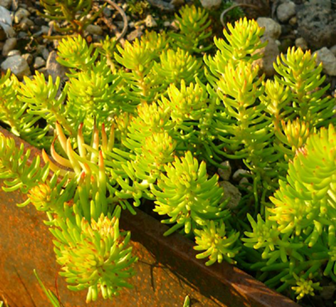Beware of the aggressors!

By Margie Lachman
There are a few plants in my garden that I regret planting because they are hard to control, spreading themselves beyond where I want them. I bought most of them at nurseries and thought they were safe. Alas! They are hard to get rid of and I wish I had known how they would behave (or not!).
Lady ferns (Athyrium filix-femina) are a constant problem as they seed themselves prolifically. They like sun and shade, coming up everywhere! Their roots are as tough as a Brillo pad and impossible to cut through with a shovel so digging them out means a big hole is left to be filled. Every bit of root must be removed or they resprout and grow like Topsie! These ‘ladies’ are no ladies but are hussies.

I cringe when I see people planting Angelina in their gardens. This attractive little succulent appears in catalogues and is an eye-catching chartreuse color. It makes a nice contrast to greener plants near it, but beware! Angelina (Angelina sedum, or stonecrop) blooms in the summer and seeds herself all over my garden—both in the ground and in planters! I now am vigilant for tiny new sprouts of her—off with her head! Fortunately, she is easily pulled up but a constant task.
Years ago, I put Lemon balm (Melissa officinalis) in my vegetable garden, seduced by the wonderful lemon scent emitted, and now find new plants all over my back yard. The plants are vigorous and leave a big hole to be filled if I don’t catch them when they are small. They appear everywhere and I must keep a sharp eye to spot them. There is fortunately an alternative herb with the lovely lemon fragrance—lemon verbena (Aloysia triphylla). It has slender leaves, great lemon scent, and is much easier to live with in the ground or pots. The leaves make fragrant tea and have been used for centuries in perfumes, vinegars, and soaps. You will be much happier with lemon verbena! It is a shrub that is hardy in our area.
Alchemia mollis or lady’s mantle is a prolific seeder that will sprout everywhere. While it is attractive, with repeat blooming of tiny chartreuse flowers that are lovely fillers in bouquets and it can make a nice edging plant, it is work to remove the bigger plants that appear where not welcome. Plant carefully and be aware of its spreading habit. Use with caution!
English ivy is the rascal that climbs and strangles trees. It is spread by birds dropping seeds so pull it out and don’t be tempted to use it as a ground cover.
When you see a tag on a plant that says, “spreads quickly” or “easily,” or “is an aggressive ground cover,” investigate before adding to your garden.
Questions? Email me at margierose2@gmail.com or leave a message at 503-645-2994.





